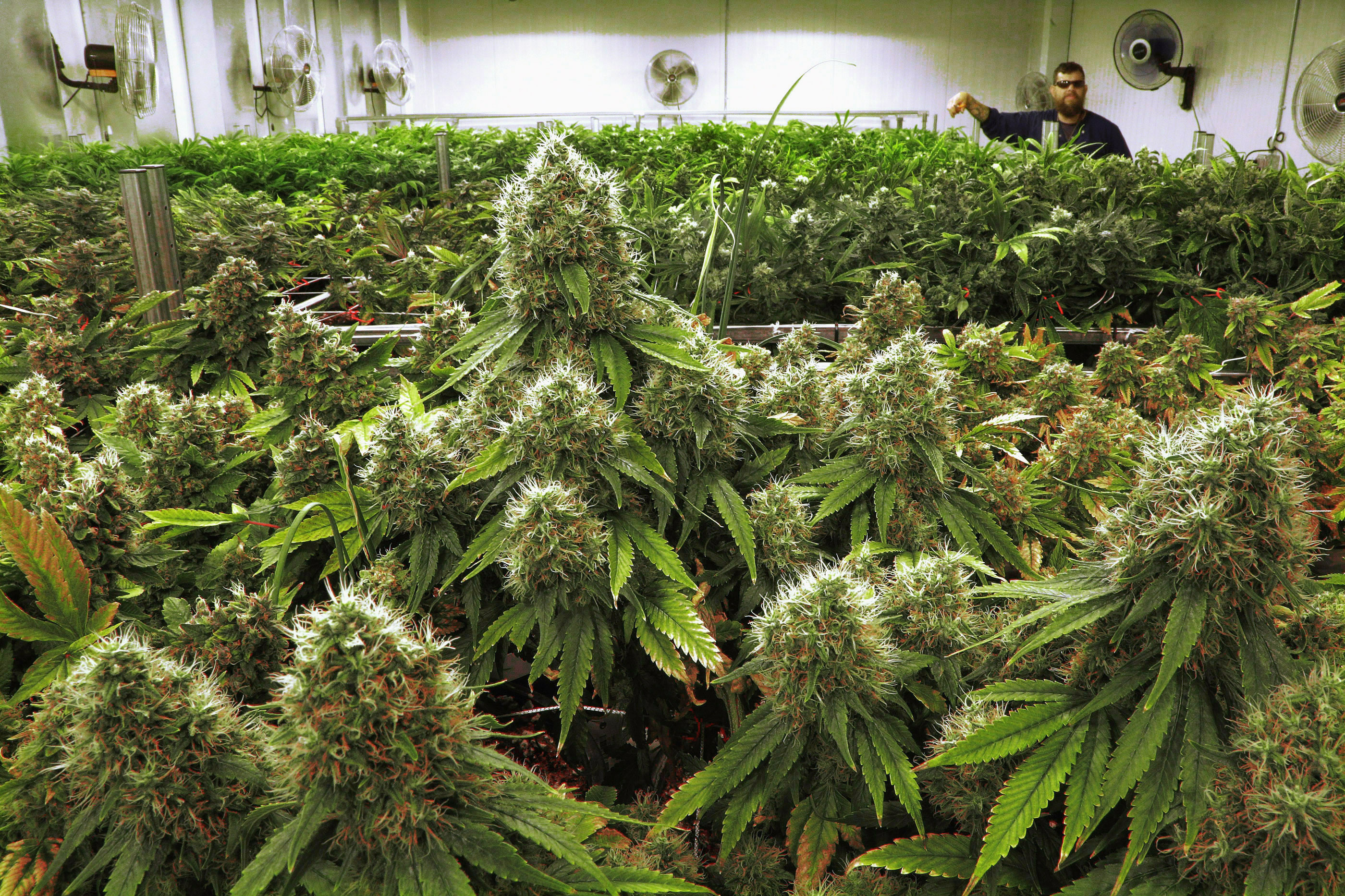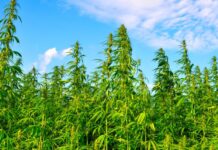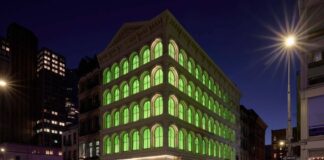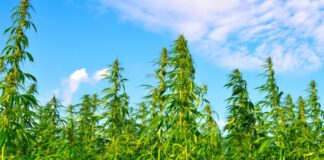Hemp, the hardworking and less potent cousin of marijuana, has been seeing a renaissance — and not just because it’s a rich source of CBD oil, which is everywhere these days.
Nope, hemp has also gone high fashion, in every sense of the word, and is finding new life with young labels including Los Angeles-based Bad Decision Adventure Club (BDAC), as well as industry veterans such as Patagonia and HoodLamb.
Hemp’s once-disparaged and now-celebrated connection with marijuana has given it new cachet, but there’s much more behind its appeal. The plant has a beneficial environmental footprint, the fiber is exceptionally durable, and it combines well with other materials such as cotton, linen, and recycled polyester.
“Hemp uses less water to crop as well as less land. It has antibacterial qualities and is a natural UV protectant,” Rachel Grant, BDAC’s founder and chief executive officer wrote to Weedmaps News in an email. “There was no way I was gonna use anything else. We are also trying to destigmatize hemp and it’s crunchy-granola vibe that it’s had for years.”
The 2018 Farm Bill that includes a provision to lift the 80-plus-year ban against industrial hemp production was passed by Congress on Dec. 12, 2018, and is expected to be signed into law soon by President Donald Trump. The news has hemp apparel companies excited. But removing hemp from the government’s list of controlled substances is only the first of many hurdles the industry will need to clear before it’s viable, cautioned Chris Gaggia, Patagonia’s workwear marketing manager.
“From a clothing point of view, the trick will be creating the processing infrastructure required for turning hemp fiber into textile,” Gaggia wrote to Weedmaps News in an email. “There are so many opportunities to put hemp to work, but it will take time to get people to understand and create the demand that can really get the industrial hemp economy into a high gear.”While the U.S. hemp industry may be in its infancy, hemp fashion is more like a teenager. It’s starting to find its place in the market, and with consumers who care as much about the ecological backstory of their clothes as they do about looking good. Here are six brands helping to make that happen.


The Bulleit Bomber by Los Angeles-based designer Bad Decisions Adventure Club (BDAC) is great for layering. In featured image, hemp sportswear by BDAC. (Photo courtesy of BDAC)
Bad Decisions Adventure Club (BDAC)
Launched in June 2017, BDAC is an emerging luxury basics brand that’s repackaging hemp into on-trend, unisex designs for a hip clientele. The company blends hemp with organic cotton for a softer feel and superior draping ability. Founder Rachel Grant said she chose hemp for its environmental footprint and durability, which are in line with the company’s social-responsibility mission. BDAC donates $5 from each product sold to L.A.-based non-profit Skid Row Housing Trust, which rehabilitates housing for homeless people. Among the standout designs are the Bulleit Bomber ($160), a stripped-down version of the style that’s great for layering, and the Johnny Tee ($90), a box-cut T-shirt that can double as a dress. Both come in a range of colors from a dusty peach to black.


The Avalon Cardigan by Nomads Hemp Wear is a soft cotton knit and has an asymmetrical hem. (Photo courtesy of Nomads Hemp Wear)
Nomads Hemp Wear
British Columbia-based Nomads Hemp Wear has been a pioneer in the hemp apparel business for nearly two decades. It has worked with fabric companies to develop softer, stretchier hemp-based cloth to produce versatile and funky men’s and women’s clothes. “I like to think what sets us apart is that we make very comfy everyday clothes with an edge,” said Louis Seguin, who founded the company with Anik Descoteaux, starting out from the back of a Volkswagen bus at outdoor festivals in 2000. Check out the women’s Avalon Cardigan ($99 CAN), a hemp-organic cotton knit that’s soft and slouchy with a sweeping asymmetrical hem. The Whistler Beanie ($26 CAN), also made of a hemp-cotton blend, will keep you warm in winter while looking downright cool.


California-based Jungmaven makes its Ojo shirt out of a blend of 55 percent hemp and 45 percent organic cotton to give the look and feel of chambray and denim. (Photo courtesy of Jungmaven)
Jungmaven
According to its mission statement, Jungmaven embraces hemp because the durable fabrics not only get better with age, but the hemp plant also helps restore environments by cleaning the soil, air, and water. The Los Angeles company expanded from its signature T-shirts to a wide range of offerings — from socks to bedding. The new men’s hemp denim Ojo shirt ($198) is like a soft hybrid of chambray and denim, owing to the fabric’s blend of 55 percent hemp and 45 percent organic cotton. Designer Robert Jungman has given the unisex French navy stripe sierra raglan sweatshirt ($134) the kind of slouchy styling that makes it a year-round classic.


Dutch designer HoodLamb, despite its name, makes outerwear completely free of wool or any other animal material. (Photo courtesy of HoodLamb)
HoodLamb
This innovative Amsterdam-based hemp outerwear brand has PETA’s seal of approval for its use of sustainable and cruelty-free fabrics. While the company has used hemp since the early 1990s, it continues to innovate with the fiber. Jackets are waterproofed with a cellulose coating that’s derived from the hemp plant, while other fabrics are spun from recycled plastic bottles. The men’s Nordic puffer ($399) features an organic cotton shell and down they call “duckless.” The women’s bomber ($350) features a faux-fur collar. The classic Nordic parka ($548) is made from a heavy-duty hemp-cotton blend and lined with an incredibly soft faux fur made of hemp and recycled polyester. The parka also features multiple interior pockets, including some that happen to fit rolling papers, sunglasses, and other highly prized valuables.


The most recognizable label among these six designers, Patagonia makes an eco-conscious farrier’s shirt that warms like a jacket. (Photo courtesy of Patagonia)
Patagonia
Patagonia is known for its commitment to ecological issues and the durability of its clothing so perhaps it wasn’t a surprise that the company used hemp for a new line of workwear. Patagonia’s Iron Forge Hemp Canvas is a mix of hemp, organic cotton and recycled polyester that they claim is 25 percent more abrasion-resistant than cotton canvas. The collection now includes a men’s unlined chore coat ($149) and a new material, All Seasons Hemp Canvas, a lighter-weight fabric that’s available in women’s bib overalls ($99). The farrier’s shirt is heavy enough to serve as a jacket, especially in the retro hickory-stripe version, but soft enough to wear as a shirt.


High fashion, indeed: These four shoe designs are a collaboration between hip-hop greats Cypress Hill and Six Hundred Four, a sneaker company that takes its name from Vancouver, British Columbia’s, area code. And yes, only 604 pairs of kicks will be produced. (Photo courtesy of Six Hundred Four)
Six Hundred Four
Vancouver, British Columbia, sneaker company Six Hundred Four, used hemp in a special collaboration with Cypress Hill, the trailblazing hip-hop group that has been advocating for marijuana for decades. The unisex shoe nicely combines classic ’90s sneaker aesthetics, such as a high, chunky platform; fun weed-related visual elements, such as an exterior heel counter trimmed to surreptitiously resemble a bong, and a stash pocket beneath the tongue. The company’s name is a play on the Canadian city’s area code and the number of limited-edition styles in each collection. As such, there are only 604 pairs made to commemorate the 25th anniversary of Cypress Hill’s seminal “Black Sunday” album. The shoes come in four colorways, from Cherry Ember, a mix of pinks and reds, to Quadruple Smoke, a black-and-gray version (yes, even the colors were chosen for their weed references). They’re $190 if pre-ordered, or $220 when they drop on April 20, 2019, the most famous weed day of the year.











